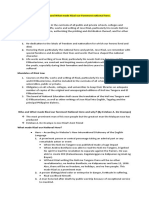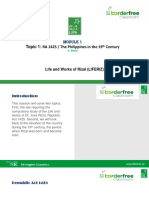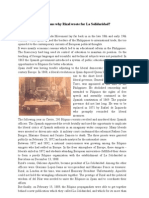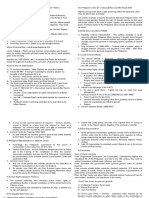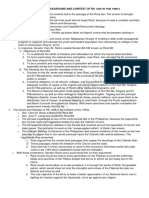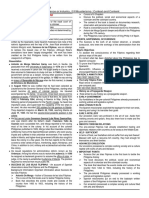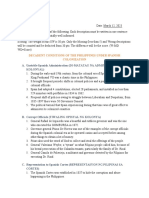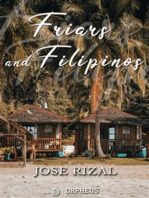0 ratings0% found this document useful (0 votes)
15 viewsRizal Reviewer
Rizal Reviewer
Uploaded by
katherinedelacruz119The document provides background information on Republic Act 1425, also known as the Rizal Law, which requires Philippine schools to teach about Jose Rizal. It discusses the law's goals of promoting nationalism and civic values. The document also outlines abuses during Spanish colonial rule in the Philippines and key dates in the country's history.
Copyright:
© All Rights Reserved
Available Formats
Download as PDF, TXT or read online from Scribd
Rizal Reviewer
Rizal Reviewer
Uploaded by
katherinedelacruz1190 ratings0% found this document useful (0 votes)
15 views6 pagesThe document provides background information on Republic Act 1425, also known as the Rizal Law, which requires Philippine schools to teach about Jose Rizal. It discusses the law's goals of promoting nationalism and civic values. The document also outlines abuses during Spanish colonial rule in the Philippines and key dates in the country's history.
Original Title
RIZAL REVIEWER
Copyright
© © All Rights Reserved
Available Formats
PDF, TXT or read online from Scribd
Share this document
Did you find this document useful?
Is this content inappropriate?
The document provides background information on Republic Act 1425, also known as the Rizal Law, which requires Philippine schools to teach about Jose Rizal. It discusses the law's goals of promoting nationalism and civic values. The document also outlines abuses during Spanish colonial rule in the Philippines and key dates in the country's history.
Copyright:
© All Rights Reserved
Available Formats
Download as PDF, TXT or read online from Scribd
Download as pdf or txt
0 ratings0% found this document useful (0 votes)
15 views6 pagesRizal Reviewer
Rizal Reviewer
Uploaded by
katherinedelacruz119The document provides background information on Republic Act 1425, also known as the Rizal Law, which requires Philippine schools to teach about Jose Rizal. It discusses the law's goals of promoting nationalism and civic values. The document also outlines abuses during Spanish colonial rule in the Philippines and key dates in the country's history.
Copyright:
© All Rights Reserved
Available Formats
Download as PDF, TXT or read online from Scribd
Download as pdf or txt
You are on page 1of 6
RIZAL REVIEWER ● Memorializing with special fondness
and devotion their lives and works
RA 1425 that have shaped the national
● Republic Act No. 1425 popularly character;
known as the Rizal Law, directs all ● Suffuse the life, works, and writings
private and public schools, colleges, of Jose Rizal which give constant
and universities to include in their and inspiring source of inspiration to
curricula courses or subjects on the the youth, especially during their
life, works, and writings of Jose formative and decisive years in
Rizal, particularly the novels Noli school; and
Me Tangere and El Filibusterismo. ● All schools are enjoyed to develop
moral character, personal discipline,
Background of Rizal Law civic conscience, and to teach the
● April 19, 1956 - “conflict in the duties of citizenship.
House of Representatives”
Congressman Jacobo Z. Gonzales The Hazard of Translation
introduced House Bill No. 5516. An ● R.A. 1425 is realistic in terms of
identical copy of House Bill No. 438. promoting the study of Rizal’s works
● April 23, 1956 - debate on Senate in their original language.
Bill No. 5516; State (Sen. ● Rizal’s writings are in Spanish, and
Laurel/Recto) and Church (Sen. translations can often lose the
Mariano J. Cuenco, Decoroso nuances and subtleties of the original
Rosales, Francisco Rodrigo). text.
● May 2, 1956 - Jose P. Laurel, ● It is important for students to learn
Committee on Education Spanish and read Rizal’s works in
recommended the approval without their original form to fully appreciate
amendment. and understand them.
● May 9, 1956 - debate started ● Not all students may have access to
following the report of the Spanish-language resources or
Committee on Education. qualified teachers who can teach the
● June 12, 1956 - Republic Act No. language.
1425 wa approved by President ● Some translations of Rizal’s works
Ramon Magsaysay. may not accurately convey the
intended meaning or may contain
Goals and Objectives of the Rizal Law errors.
● It was intended to the rededication
on the ideals of freedom and Translators
nationalism for which our heroes 1. Pascual G. Poblete (1909) - Filipino
lived and died; writer, journalist, and linguist,
remarkably noted as the first
translator of Jose Rizal’s Noli Me 4. Human Rights Denied to Filipinos
Tangere into the Tagalog language. ● The people of Spain did have Human
2. Pedro Gatmatian (1948) - A writer Rights and they enjoyed it ( Freedom
and poet. of Speech, Freedom of the Press and
3. Patricio Mariano (1961) - a Filipino Freedom to Assembly). However,
nationalista, revolutionary, pundit the Spanish who cherished these
(poet), playwright, dramatist, short Rights in Spain denied them to our
story writer, novelist, journalist, fellow country men, the Filipinos.
violinist, and painter. 5. No Equality Before the Law
4. Antonio at Melendez-Cruz (1991). ● Spaniards considered our ancestors
5. Virgilio Almario (1998). Roi Alma, as inferior beings to them.
is a Filipino author, poet, critic, ● Leyes de Indian ( Laws of the
editor, teacher, and cultural manager. Indies). Promulgated by the
He is a National Artist. Christians monarchs of Spain,
6. Gimena at Navaro Filipinos were abused, brutalized,
persecuted and slandered by their
Spanish Misrules and Abuses Spanish matters.
1. Instability of Colonial 6. Racial Discrimination
Administration ● During Rizal’s time a white skin,
● Frequent shift of policies owing to pointy nose and Castillian lineage
struggle between liberalism and were a badge of vaunted superiority.
despotism. Indios were supposed to be called
2. Corrupt Colonial Officials inferior beings because of the color
● Governor General Miguel Primo De of the skin, hair, and shape of their
Rivera - a Spanish dictator and nose.
military officer who ruled as the 7. Maladministration of Justice
prime minister of Spain was one of ● Justice was costly, partial and slow.
the corrupt officials. He operated To poor Filipinos they had no access
casinos and accepted bribes to obtain to the courts . To the Filipino masses,
a lot of money. Friars also used the litigation in court was a calamity.
word of God to collect and steal the 8. Frailocracy
offerings of the people. ● Friars ( Augustinians, Dominicans,
3. Philippine Representation in Spanish and Franciscans) - controlled the
Cortes religious educational life of the
● The Spanish cortes was established Philippines and later in the 19th
in 1837 to hide the corruption and century they acquired tremendous
abuse happening in the Philippines. political power, and influence.
With this, the Philippines was poorly
represented and resulted in various
atrocities of the Spanish colonizers.
9. Forced Labor Spanish Peninsular Troops of their
● Polo y Servicio - a compulsory labor work in policing towns. It consisted
imposed by the Spanish authorities of a body of Filipino policemen
on adult Filipino male in the organized originally in each of the
construction of establishments. provincial capitals -the oldest law
Filipino male ranging from 16 to 60 enforcement agency in Spain and is
years old were obliged to render one of two national police forces.
forced labor for 40 days a year. The
workers could be placed on any Dates to Remember
project the Spanish wanted, despite ● 1805 - Nueva Vizcaya Revolt
hazardous or unhealthy conditions. ● 1807 - Ambaristo Revolt
10. Hacienda Were Owned by the Friars ● The Last Galleon Left Manila for
● Rizal tried to initiate agrarian reform Mexico
in 1887 but in vain, ignited the wrath ● 1813 - Spain ended the Galleon
of the Dominican Friars who Trade
retaliated by raising land rentals. ● 1815 - The Last State Galleon Left
● The agrarian reform aimed at Acapulco for Manila
modernizing the feudal structure of ● 1821 - The Philippines as Province
southern agriculture by expropriating of Spain
the most unproductive portions of ● 1823 - Rebellion of Andres Nobales
the large estates (latifundia) and ● 1834 (Sept. 6) - Royal Decree
redistributing them to landless Officially Opened Manila to the
peasants in the form of small World Trade
holdings. ● 1837 - Manila Officially Opened to
● Feu·dal·ism - the dominant social the World Commerce
system in medieval Europe, in which ● 1849 - Gov. Gen. Narciso Claveria y
the nobility held lands from the Zaldua Issued the Claveria Decree
Crown in exchange for military (Catálogo de Alfabético de
service, and vassals were in turn Apellidos)
tenants of the nobles, while the
peasants (villeins or serfs) were Economic History: Opening of the
obliged to live on their lord's land Philippines to the World
and give him homage, labor, and a ● 1815 - the last galleon arrived in
share of the produce, notionally in manila (Manila to Acapulco) -
exchange for military protection 1830’s
11. Guardia Civil Abuses ● 1834 - Manila officially opened to
● The police organization was created the world commerce
by the Royal Decree issued by the ● The rise of hacienda and cash-crop
Spanish Crown government on economy
February 12, 1852. It relieved the
● Expansion of export products in ● Espouses the theory that God
Europe to Suez Canal (1869) endowed man with natural rights
● The Philippines became a major such as the right to life, liberty, and
exporter (sugar, tobacco, coffee, and property.
abaca) and became well-known in ● According to this theory, kings
other parts of the world. derive their power from the people.
● 1834-1873 - different ports were ● Rulers have the obligation to look
opened: Sual (Pangasinan); Iloilo; after the general welfare, the people
Zamboanga; Cebu; and Legazpi. have the obligation to support their
rulers.
Social History: Birth of the Middle Class
Social Classes in the Philippines Philosophers that Contributed to Rizal’s
● Peninsulares - Insulares - Spaniards Thinking
born in the Philippines ● John Locke
● Middle Class - Spanish Mestizo or ● Voltaire
Mestizo de Espanol; the principalia; ● Jean-Jaques Rousseau
and the Chinese mestizos or mestizos ● Thomas Hobbes
de sangley ● Hegel
● Chinese - people from China ● Mikhail Bakunin
migrated in the Philippines ● Karl Marx
● Indio - Malayan inhabitant in the ● Friedrich Engels
archipelago.
Marx and Rousseau
● Espoused the theory that God
endowed man with natural rights
POLITICS, RELIGION, AND such as right to life, liberty, and
EDUCATION property, and by entering into a
social contract, man formed a civil
The Divine Right Theory society to protect his right.
● Very popular through the 15th - 18th ● When governance is oppressive it is
centuries. the right of the people to overthrow
● God created the state and chose such a government.
individuals to be given a “royal ● Man is inherently good but the false
birth” and therefore the “divine right values of society corrupt him.
to rule”. ● Everything is God when it leaves the
● Opposition to the ruler is both hands of God but everything
treason and moral sin. degenerates in the hands of man.
● Justifies absolute monarchy. ● Man is born free but everywhere in
chains.
Social Contract Theory
Mikhail Bakunin Feudalism
● Hated all forms of authority. ● A system of land ownership and
work relations during the middle
Marx and Hegel ages particularly in Europe.
● Share the theory that progress takes ● Landlords owning vast tracts of
place, conflicts are inevitable. lands by virtue of conquest or land
● Destruction of something old to grabbing.
create something new. ● Feudalism is the term invented in the
16th century by royal lawyers to
Voltaire describe the social, political, and
● Pen is mightier than sword. economic society out of which the
modern state was emerging.
Religiosity was merged with politics: ● Feudalism came from the German
religious doctrines and dogma serveda a word feud or “cow”.
persuasive sanctions. ● Fief - means something or value,
usually a land.
WORLD EVENTS ● Order giver and follower
- Opening of the Suez Canal in 1869 relationship.
allowed liberal ideas to flow into the ● Master-servant
archipelago. ● The fundamental feature of such
- England was the leading world work relations is that the
power. subordinate, servant, or worker is
- Japan opened its door to the Western obliged, if not coerced, to do the
world after 2124 years of isolation. bidding of his master without
- In the second half of the 19th question, under pain of some
century, ilustrados started the sanction.
Propaganda movement. They
exposed the social ills in the Definition of Terms
Philippines and struggled to gain ● Bureaucracy - a system of
freedom for the Filipinos. government in which power is
- La Solaridad was the official organ; divided among different departments
exposition on abuses of friars and and officials.
civil authorities were biting and ● Encomienda - a Spanish labor
satirical. system that rewarded conquerors
- Propaganda movement exerted much with the labor of conquered
effort to awaken the Filipinos to the non-Christian people.
excesses of the authorities and stirred ● Encomiendero - receiver of the grant,
up their sentiments. could extract tributes from the Indios
in gold, kind, and labor, and was
FEUDALISM required to protect them and instruct
them in the Christian faith. The
encomienda did not include a grant
of land, but in practice the
encomienderos gained control of
land.
● Gobernadorcillo - the leader of a
town or pueblo. The highest
government position held by a
Filipino.
● Principalia - the principalia or the
noble class, was the ruling and
usually educated upper class in the
pueblo.
● Conquistador - the one that conquers,
specifically a leader in the Spanish
conquest of America and especially
of Mexico and Peru in the 16th
century.
● Friars - the vanguards of the
Christian faith.
● The Barrio was administered by the
Cabeza de Barangay who served as
tax and contributions collector for
the gobernadorcillo.
Feudal Relations Results
● Inequitable - Inequality
● Exploitative - Exploitation
● Oppressive - Oppression
World Trade Crops
● Sugar
● Indigo
● Tobacco
● Coffee
● Rice
● Corn
● Silk
● spices
You might also like
- PP 2021 Icas en Eng D CDocument46 pagesPP 2021 Icas en Eng D CChu Steven100% (1)
- Public Value and Art For All?Document20 pagesPublic Value and Art For All?yolandaniguasNo ratings yet
- LitCharts War PhotographerDocument18 pagesLitCharts War PhotographerDavid100% (1)
- Difference Between Policy and StrategyDocument4 pagesDifference Between Policy and StrategyAbu Taleb83% (6)
- Life and Works of Rizal: Chapter 16: Biography and National HistoryDocument43 pagesLife and Works of Rizal: Chapter 16: Biography and National HistoryAmontos Edjie Kent100% (6)
- Life and Work of Rizal Notes FinalDocument12 pagesLife and Work of Rizal Notes FinalRio Awitin100% (1)
- Group 5: Matin-Ao, John Dale Misa, Philbert Montecillo, Clarissa Muit, LykahDocument27 pagesGroup 5: Matin-Ao, John Dale Misa, Philbert Montecillo, Clarissa Muit, LykahBeverly Kate LopezNo ratings yet
- The Life and Works of RizalDocument4 pagesThe Life and Works of RizalDaniela LacdangNo ratings yet
- Liferiz Module 1Document11 pagesLiferiz Module 1Limuel MacasaetNo ratings yet
- What Are The Reasons Why Rizal Wrote For La Solidaridad?Document4 pagesWhat Are The Reasons Why Rizal Wrote For La Solidaridad?ShinjiNo ratings yet
- Prelim Topic 2 19th Century Philippines 2Document56 pagesPrelim Topic 2 19th Century Philippines 2jerian uyNo ratings yet
- SW#2Document4 pagesSW#2NellAriane AlayonNo ratings yet
- Rizal Reviewer Midterm 1 4Document11 pagesRizal Reviewer Midterm 1 4Joshua DaguroNo ratings yet
- Life and Works of Jose RizalDocument5 pagesLife and Works of Jose RizalMary Rose Destajo DomanaisNo ratings yet
- Intro To Chapter 4 in RizalDocument121 pagesIntro To Chapter 4 in RizalYsabelle TagarumaNo ratings yet
- The Philippines in The 19th Century As Rizal's Context: Economic, Social & Political AspectsDocument46 pagesThe Philippines in The 19th Century As Rizal's Context: Economic, Social & Political AspectsJane Cresthyl Lesaca75% (4)
- LWR ReviewerDocument9 pagesLWR ReviewerアーロンクリスチャンNo ratings yet
- RizalDocument14 pagesRizalHoney Ghien AcudesinNo ratings yet
- JJHGGDocument7 pagesJJHGGRitchel CiprianNo ratings yet
- SOCSC 005 Module 4Document9 pagesSOCSC 005 Module 4Khent Daryl FranciscoNo ratings yet
- Ferdinand Magellan: Humabon Were Baptized As CatholicsDocument7 pagesFerdinand Magellan: Humabon Were Baptized As CatholicsKristine Joyce NodaloNo ratings yet
- PHILIPPINEDocument56 pagesPHILIPPINERhea Mae QuinicotNo ratings yet
- Rizal Law: BicameralDocument8 pagesRizal Law: BicameralCharie MaeNo ratings yet
- RIZALDocument9 pagesRIZALMariella Erika TayaNo ratings yet
- Module 5 RizalDocument9 pagesModule 5 RizalMonkey D DragonNo ratings yet
- CH 8 - Imagining A Nation - Rizal 1Document4 pagesCH 8 - Imagining A Nation - Rizal 1qlalboongalingNo ratings yet
- Reviewer in RizalDocument22 pagesReviewer in Rizalkathleenblaire.ductaNo ratings yet
- Group 7: Rizal'S Annotations of Sucesos of de Las Islas FilipinasDocument23 pagesGroup 7: Rizal'S Annotations of Sucesos of de Las Islas FilipinasJoreylee Ann ReyNo ratings yet
- Rizal Notes MidtermDocument9 pagesRizal Notes Midterms2120130No ratings yet
- The Life and Works of Rizal Module PrelimDocument10 pagesThe Life and Works of Rizal Module PrelimRay Phillip G. JorduelaNo ratings yet
- The Propaganda Movement and La SolidaridadDocument30 pagesThe Propaganda Movement and La SolidaridadJade Alciso73% (15)
- The Propaganda Movement and La SolidaridadDocument30 pagesThe Propaganda Movement and La SolidaridadMorbid Freelance100% (1)
- 02 19th CENTURY PHILIPPINES AS RIZALDocument5 pages02 19th CENTURY PHILIPPINES AS RIZALJohn Ernest PlatilNo ratings yet
- Philippine History Spanish EraDocument45 pagesPhilippine History Spanish EraEdgar DumagpiNo ratings yet
- Module 5Document3 pagesModule 5carbonellhanNo ratings yet
- Rizal ReviewerDocument25 pagesRizal ReviewervillajuanalleahNo ratings yet
- LIFE AND WORK OF RIZAL (Reviewer)Document5 pagesLIFE AND WORK OF RIZAL (Reviewer)bbmrlnsbiopstrNo ratings yet
- Lifes and Works of Rizal (Midterms) : Lesson 1Document31 pagesLifes and Works of Rizal (Midterms) : Lesson 1Lovelyn Maristela100% (1)
- Rizal NotesDocument5 pagesRizal Notesmelaniegrapes183No ratings yet
- Life and Works of RizalDocument8 pagesLife and Works of RizalBella BinasingNo ratings yet
- LWR Reviewer For MidtermDocument23 pagesLWR Reviewer For MidtermKRYZLL JAILE PATUALNo ratings yet
- Filipino Nationalism AcceleratorsDocument9 pagesFilipino Nationalism AcceleratorsShereen AlobinayNo ratings yet
- Assignment - RizalDocument2 pagesAssignment - RizalShiela VergaraNo ratings yet
- 19 Century Philippines As Rizal's Context: Group 1Document47 pages19 Century Philippines As Rizal's Context: Group 1Elisha XDNo ratings yet
- Lesson Hand Out Socsci 3 Philippine HistoryDocument8 pagesLesson Hand Out Socsci 3 Philippine Historydanilo pastorfideNo ratings yet
- SOCSCC 005 Module 5Document4 pagesSOCSCC 005 Module 5Yuan Kyle SantosNo ratings yet
- Nationalism Period 21stDocument7 pagesNationalism Period 21stoctavianojanineNo ratings yet
- Colonial in The PhilippinesDocument18 pagesColonial in The PhilippinesJonalyn AnchetaNo ratings yet
- Decadents and HeroesDocument6 pagesDecadents and HeroesCrystelle LagmayNo ratings yet
- Readings in PH History Week 6-7Document47 pagesReadings in PH History Week 6-7Jensen Rowie PasngadanNo ratings yet
- LESSON 3 ContinuationDocument15 pagesLESSON 3 Continuationgamingemail8080No ratings yet
- The Life and Works of Rizal: Narlyn P. Dela CruzDocument39 pagesThe Life and Works of Rizal: Narlyn P. Dela CruzYanna ManuelNo ratings yet
- Dypen - PPT in Rizal01234 1Document55 pagesDypen - PPT in Rizal01234 1Jan Lester TipdasNo ratings yet
- Rizal Reporting NotesDocument12 pagesRizal Reporting NotesNielmarkNo ratings yet
- Introduction To Rizal's Life, Works, and WritingsDocument27 pagesIntroduction To Rizal's Life, Works, and WritingsIgnite Night100% (1)
- Sucesos de Las Islas FilipinasDocument6 pagesSucesos de Las Islas FilipinasAriel John SiguaNo ratings yet
- RPH - Spanish Colonization Way of LifeDocument51 pagesRPH - Spanish Colonization Way of Lifejerome yanoNo ratings yet
- Assignment #1 - Decadence - HeroesDocument4 pagesAssignment #1 - Decadence - HeroesMAURE, MARIZ,BONGGATNo ratings yet
- 11social EvilsDocument19 pages11social EvilsShane Alden V. GalindezNo ratings yet
- Chapter-1 RizalreviewerDocument7 pagesChapter-1 RizalreviewerJomari HerraduraNo ratings yet
- The Most Outstanding Propagandist Was Jose RizalDocument5 pagesThe Most Outstanding Propagandist Was Jose RizalAnonymous G7AdqnemziNo ratings yet
- Beautiful Philippines: A Handbook of General InformationFrom EverandBeautiful Philippines: A Handbook of General InformationNo ratings yet
- Friars and Filipinos / An Abridged Translation of Dr. Jose Rizal's Tagalog Novel, / 'Noli Me Tangere.'From EverandFriars and Filipinos / An Abridged Translation of Dr. Jose Rizal's Tagalog Novel, / 'Noli Me Tangere.'No ratings yet
- Remainders of Aa X + BX - Yimin Ge - XDocument4 pagesRemainders of Aa X + BX - Yimin Ge - XkoglebaNo ratings yet
- Soul WinningDocument8 pagesSoul WinningCharlize Fernandez100% (1)
- Basic Chocolate Cake With Flavor Variations - Veena's Art of CakesDocument3 pagesBasic Chocolate Cake With Flavor Variations - Veena's Art of CakesBellezza MarNo ratings yet
- Discourse and ClassroomDocument12 pagesDiscourse and ClassroomAdam AdiyatmaNo ratings yet
- BMC Women's Health: Eating DisordersDocument6 pagesBMC Women's Health: Eating DisorderslinhamarquesNo ratings yet
- PRT2008 First QuizDocument5 pagesPRT2008 First QuizKong PatrickNo ratings yet
- Distance Vs DisplacementDocument19 pagesDistance Vs DisplacementMarArizala100% (1)
- Harish Mba ProjectDocument72 pagesHarish Mba ProjectchaluvadiinNo ratings yet
- ECE342 Course NotesDocument165 pagesECE342 Course NotesJordan ChipchuraNo ratings yet
- PHASE I (The Outline of The Foundation) (4-5 Weeks)Document3 pagesPHASE I (The Outline of The Foundation) (4-5 Weeks)AhmadNo ratings yet
- Engineering Economics: Various Concepts Used in Economic AnalysisDocument6 pagesEngineering Economics: Various Concepts Used in Economic AnalysisJai ChaudhryNo ratings yet
- Why Are Teenagers Very Fond of Social Networking Sites?"Document43 pagesWhy Are Teenagers Very Fond of Social Networking Sites?"Nicole Marin-Ching0% (1)
- Reading Comprehension - Donald Trump, The Anti-ImperialistDocument2 pagesReading Comprehension - Donald Trump, The Anti-Imperialistquesnot.englishteacherNo ratings yet
- Math - Ed. 422 GeometryDocument8 pagesMath - Ed. 422 GeometryHari PrasadNo ratings yet
- 6 Essential Skills For Reading ComprehensionDocument5 pages6 Essential Skills For Reading ComprehensionSaleem Raza100% (1)
- The Decline of The Cow: Agricultural and Settlement Change in Early Medieval IrelandDocument16 pagesThe Decline of The Cow: Agricultural and Settlement Change in Early Medieval IrelandoldenglishblogNo ratings yet
- Techni Manual For ANASTU - 2020Document280 pagesTechni Manual For ANASTU - 2020Sanket kharsadeNo ratings yet
- AESA Catalogue LV 05-05Document105 pagesAESA Catalogue LV 05-05joshyvattakkerry100% (2)
- Berkana Rune Meaning The Modern CurioDocument8 pagesBerkana Rune Meaning The Modern Curioshivam1969100% (1)
- AashtoDocument2 pagesAashtophanna100% (1)
- Assessing GrammarDocument21 pagesAssessing GrammarCristian OlariuNo ratings yet
- 8 - M (Physical) 8 - M: Period PeriodDocument1 page8 - M (Physical) 8 - M: Period Periodhafsa khalidNo ratings yet
- 16 Tenses (Definition, Usage, Example, Exercises)Document16 pages16 Tenses (Definition, Usage, Example, Exercises)FajarZainNo ratings yet
- Peptic Ulcer DiseaseDocument2 pagesPeptic Ulcer DiseaseMichala100% (1)
- Assignment 5Document10 pagesAssignment 5Joseph PerezNo ratings yet
- Republic Vs HidalgoDocument2 pagesRepublic Vs HidalgoIñigo Mathay Rojas100% (4)





